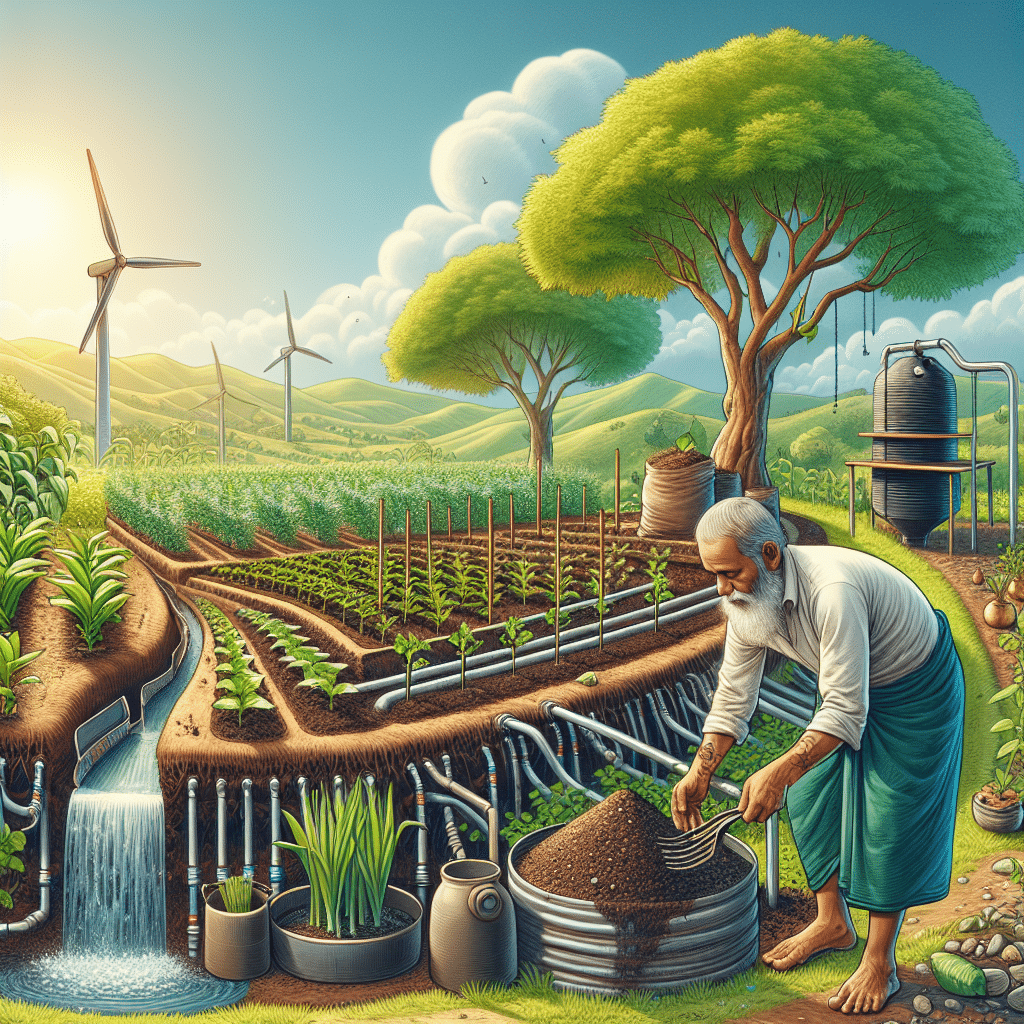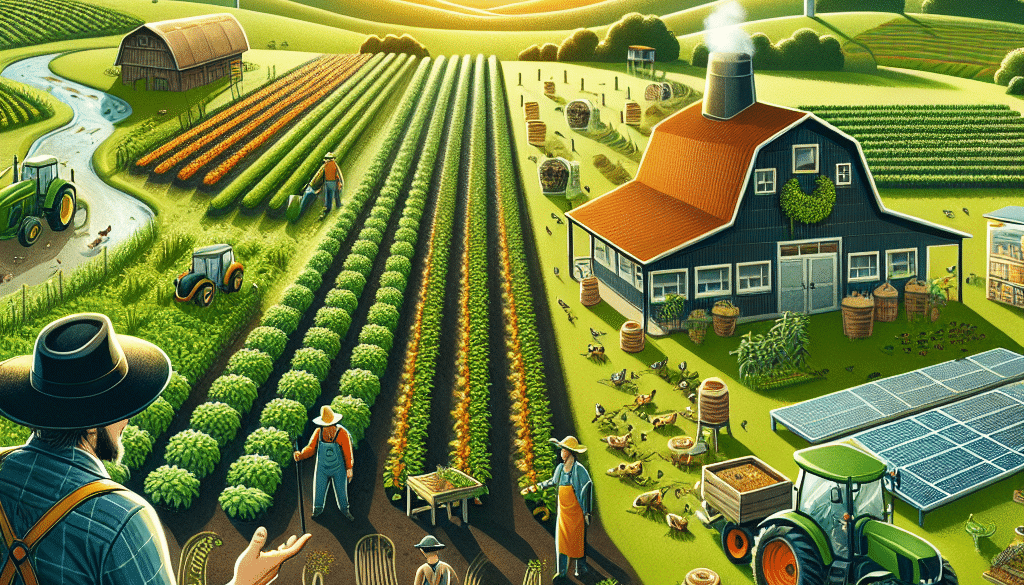Organic Farming: Sustainable Methods Explored
-
Table of Contents
- Organic Farming: Pioneering Sustainable Agriculture Methods
- Understanding Organic Farming
- The Pillars of Organic Agriculture
- Sustainable Methods in Organic Farming
- Crop Rotation
- Green Manures and Cover Crops
- Biological Pest Control
- Composting
- Agroforestry and Permaculture
- Benefits of Organic Farming
- Real-World Examples and Case Studies
- Conclusion: Embracing Organic for a Sustainable Future
- Enhance Your Health with ETprotein’s Organic Protein Products
Organic Farming: Pioneering Sustainable Agriculture Methods

Organic farming stands at the forefront of sustainable agriculture, offering a beacon of hope for the future of food production. This method of farming is not just a trend; it’s a return to traditional agricultural practices that respect the earth and its natural processes. With the increasing awareness of environmental issues and consumer health, organic farming has gained significant traction, promising a path to a more sustainable and healthier world. In this article, we explore the various sustainable methods employed in organic farming, their benefits, and real-world examples that illustrate the positive impact of these practices.
Understanding Organic Farming
Organic farming is a holistic approach to food production that emphasizes the use of natural substances and processes to maintain soil fertility, control pests, and produce crops. It prohibits the use of synthetic fertilizers, pesticides, genetically modified organisms (GMOs), and growth hormones, ensuring that the food produced is natural and free from harmful chemicals.
The Pillars of Organic Agriculture
Organic farming is built on four main principles:
- Health: It sustains and enhances the health of soil, plants, animals, humans, and the planet as one and indivisible.
- Ecology: It is based on living ecological systems and cycles, working with them, emulating them, and helping sustain them.
- Fairness: It builds on relationships that ensure fairness with regard to the common environment and life opportunities.
- Care: It is managed in a precautionary and responsible manner to protect the health and well-being of current and future generations and the environment.
Sustainable Methods in Organic Farming
Organic farmers employ a variety of sustainable methods to achieve their goals. Here are some of the key practices:
Crop Rotation
Crop rotation is a fundamental practice in organic farming. It involves alternating the types of crops grown in a particular area with each planting season. This diversity prevents the depletion of soil nutrients, reduces soil erosion, and disrupts the cycles of pests and diseases.
Green Manures and Cover Crops
Organic farmers use green manures and cover crops to enhance soil fertility and structure. These plants are grown not for harvest, but to be plowed back into the soil, where they decompose and enrich it with organic matter and nutrients.
Biological Pest Control
Instead of relying on synthetic pesticides, organic farmers use natural predators and parasites to control harmful pests. This method maintains the ecological balance and reduces the risk of pests developing resistance to control measures.
Composting
Composting is the process of recycling organic matter, such as crop residues and animal manures, into a rich soil amendment. This practice not only reduces waste but also improves soil structure, moisture retention, and nutrient content.
Agroforestry and Permaculture
Agroforestry combines agriculture and forestry to create more diverse, productive, and sustainable land-use systems. Permaculture is a design system that mimics the patterns and relationships found in nature to create sustainable and self-sufficient ecosystems.
Benefits of Organic Farming
Organic farming offers numerous benefits, including:
- Environmental Protection: By avoiding synthetic chemicals, organic farming reduces pollution and conserves water and soil.
- Biodiversity: Organic farms support a greater variety of plants and animals, enhancing ecosystem resilience.
- Climate Change Mitigation: Organic farming practices, such as using cover crops and reduced tillage, can sequester carbon in the soil.
- Improved Health: Organic foods are free from harmful pesticides and chemicals, potentially reducing health risks for consumers.
- Economic Sustainability: Organic farming can be more profitable than conventional farming due to premium prices and reduced input costs.
Real-World Examples and Case Studies
Across the globe, organic farming is making a difference. For instance, in India, the state of Sikkim has been declared 100% organic, with all of its farmland following organic practices. This transition has improved the health of its citizens and environment while boosting tourism and local economies.
In the United States, the Rodale Institute’s Farming Systems Trial is America’s longest-running side-by-side comparison of organic and conventional agriculture. Over 30 years of research has shown that organic farming is competitive in yields, outperforms conventional in years of drought, and is more profitable due to lower input costs and higher market prices.
Conclusion: Embracing Organic for a Sustainable Future
Organic farming is more than just an alternative method of agriculture; it’s a commitment to a sustainable future. By exploring and implementing sustainable methods, organic farmers are leading the way in environmental stewardship, health, and economic viability. The evidence is clear: organic farming has the potential to address many of the world’s pressing issues, from climate change to food security.
Enhance Your Health with ETprotein’s Organic Protein Products
For those looking to complement their diet with high-quality, sustainable protein sources, ETprotein offers a range of organic plant-based protein products. Their commitment to non-GMO, allergen-free, and neutral-tasting ingredients ensures that you’re not only supporting sustainable agriculture but also receiving the best nutrition for your body.
About ETprotein:
ETprotein, a reputable plant protein vegan protein Chinese factory manufacturer and supplier, is renowned for producing, stocking, exporting, and delivering the highest quality organic bulk vegan protein and plant proteins. They include Organic rice protein, clear rice protein, pea protein, clear pea protein, watermelon seed protein, pumpkin seed protein, sunflower seed protein, mung bean protein, peanut protein etc. Their offerings, characterized by a neutral taste, non-GMO, allergen-free attributes, cater to a diverse range of industries. They serve nutraceutical, pharmaceutical, cosmeceutical, veterinary, as well as food and beverage finished product distributors, traders, and manufacturers across Europe, USA, Canada, Australia, Thailand, Japan, Korea, Brazil, and Chile, among others.
ETprotein specialization includes exporting and delivering tailor-made protein powder and finished nutritional supplements. Their extensive product range covers sectors like Food and Beverage, Sports Nutrition, Weight Management, Dietary Supplements, Health and Wellness Products, and Infant Formula, ensuring comprehensive solutions to meet all your protein needs.
As a trusted company by leading global food and beverage brands and Fortune 500 companies, ETprotein reinforces China’s reputation in the global arena. For more information or to sample their products, please contact them and email sales(at)ETprotein.com today.














